Working Time
| Mon-Sat morning | 10:00 am – 2:00 pm |
| Mon-Sat evening | 4:30 pm – 6:30 pm |
| Lunch Time | 2:00 am – 4:30 pm |
| Sunday | Close |
Doctors Timetable
| Dr Manjinder Singh | 10:00 am – 2:00 pm |
| Dr Amandeep Kaur | 11:00 am – 2:00 pm |
| Dr Manjinder Singh | 4:30 am – 6:30 pm |
| Sunday | Close |
Quick Pricing
| Consultation Fee | Rs.200/- |
Emergency Case
Emergency dental care may be needed if you have had a blow to the face, lost a filling, or cracked a tooth.
Post-Operative Instructions
Post-Operative Instructions
- Extraction
- Root Canal Treatment
- Gum Surgery
- Apicoectomy (Root Canal Surgery)
- Don’t forget to floss the backs of your molars!
- Fillings
- Teeth Cleaning/Deep Cleaning
- Implant Surgery
- Bone Graft Surgery
- Crowns and Bridges
- Placement of Braces
- Denture Delivery
Extraction:
What can I expect after surgery?
- Minor bleeding and “oozing” for 1-2 days.
- Pain and discomfort slowly improving in 1-5 days.
- Swelling for 1 week becoming worse on the 2nd and 3rd day after surgery
- Tightness and stiffness to the jaw and joint areas.
What are my post-operative instructions?
- After the first 24 hours following surgery, rinse gently with warm salt water after every meal. This can continue 1-2 weeks. Brush gently avoiding the extraction sites for 1-2 weeks.
- You may be biting on gauze when you leave the clinic. This gauze should remain for 30 minutes. After that, you may take the gauze out and observe the extraction area. If it is bleeding like a fresh wound (bright red, dripping blood) bite on additional fresh gauze for approximately 30 more minutes. Repeat as necessary until the area is slight oozing and blood is dark & clotting. Remember a little blood and a lot of saliva will look like a lot of blood, usually it is just a lot of saliva.
- Do not smoke, spit, drink through a straw, or drink carbonated beverages for 3 days after surgery.
- No rinsing for the first 24 hours. Oral & Maxillofacial Surgery Tooth Extraction Post-Operative Instructions - 2 -
- If you had upper teeth removed avoid blowing your nose and sneezing for the first week (if you must sneeze, do so with your mouth open to prevent sinus damage).
- Use an ice pack to reduce swelling and pain. Ice packs can be applied for 20 minutes on and 10 minutes off for the first 24 hours (while awake). After the first 24 hours, discontinue ice and use warm moist heat.
Caring for a New Filling

Figure out how long it takes your filling to set. There are several types of dental fillings and each takes a different amount of time to set. Being aware of the setting time will give you a general time frame for which you should be especially careful not to inflict any damage on the filling.
Gold, amalgam, and composite fillings take about 24-48 hours to set.[3]
Ceramic fillings set immediately with the help of a blue dental light.[4]
Glass ionomers set within 3 hours of filling, but it may take 48 hours for them to feel hard.[5]
Take pain medication if needed.

You can take over the counter pain medication before the anesthetic wears off and continue this treatment until your sensitivity subsides. This will help with any swelling or pain you might experience.[6]
Ask your dentist if you need to take pain medication to manage post-operative sensitivity. Follow the package or your dentist’s instructions for taking pain relievers after a filling.[7]

Sensitivity will generally improve within one week.[8]
Avoid food and beverages until the anesthetic wears off. Your mouth will feel numb for a few hours after a filling because of the anaesthetic administered during the procedure.
If you can, avoid eating or drinking until the anesthetic wears off so that you don’t injure yourself.[9]
If you do eat or drink, the numbness may make it difficult to gauge the temperature or you may end up biting the inside of your cheek, tongue or tip.[10]
If you can’t wait to eat or drink, try soft foods like yogurt or applesauce and simple beverages like water. Chew using the opposite side of your mouth than the filling to help
ensure that you don’t injure yourself or damage the filling.[11]

Avoid very hot and very cold foods and beverages.
Your teeth and the filling will likely be sensitive for a few days after the procedure. Avoid consuming food and beverages that are very hot or very cold to control sensitivity and pain, and also that might damage your filling.[12]
Very hot or cold foods and beverages can disrupt the bond of fillings.
Composite fillings are generally bonded to the tooth.
The bonding process continues for at least 24 hours, so it’s advisable to consume lukewarm foods/beverages during this time.
Hot and cold temperatures make the filling material expand and contract, especially if they are metal.This alters the filling adaptability, shape, and strength of the material and may cause fractures or leaking.[13]
Make sure to allow cooling time for hot foods like soup or baked dishes including lasagna as well as heated beverages such as coffee and tea before you consume them.

Avoid hard, chewy, or sticky foods. Try to avoid foods that are hard, chewy, or sticky for a few days after a filling. Foods such as candies, granola bars, and raw vegetables can cause potential problems, including pulling out the filling.[14]
Biting hard foods can fracture your filling or your tooth. Sticky foods can adhere filled tooth surfaces for a long time and make them more susceptible to cavities.
Food stuck in between the teeth can weaken a filling and puts you at higher risk for more cavities. To avoid this, rinse your mouth out after every snack or meal and use fluoridated mouthwash after brushing and flossing.
Crowns and Bridges (also Inlays and Onlays):
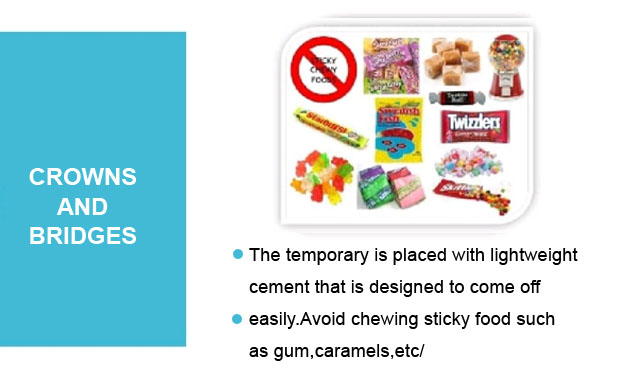
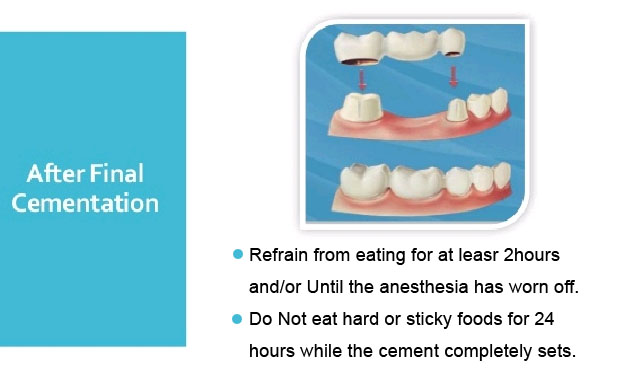
1- Crowns and bridges usually take 2 or 3 appointments to complete. On the first appointment, the tooth/teeth are prepared, impressions are taken, and a temporary crown is placed on your tooth/teeth.
2- You may experience sensitivity, gum soreness, and slight discomfort on the tooth/teeth; it should subside after the placement of the permanent crown(s).
3- Whenever anesthesia is used, avoid chewing on your teeth until the numbness has worn off.
4- A temporary crown is usually made of plastic-based material or soft metal. It can break if too much pressure is placed on it. The crown may also come off; if it does, save the crown and call our office. The temporary crown is placed to protect the tooth and prevent other teeth from moving. If it comes off it should be replaced as soon as possible. To avoid losing your temporary, do not chew on sticky or hard food (chewing gum, ice). Try to chew on the opposite side of the temporary as much as possible.
5- Continue your normal brushing but be careful while flossing around the temporaries (remove the floss gently from the side). If it is difficult to get the floss between the temporary and surrounding teeth, refrain from flossing until you receive your permanent crown.
6- After the permanent restoration is placed you may feel slight pressure for a few days. Also, the bite may feel different for a day or two. But if after 2-3 days the bite still feels uneven or if you feel discomfort when chewing on the tooth, call our office. Delaying the necessary adjustments may damage the tooth permanently.
7- Call our office if you are in pain or if you have any questions.
Root Canal Treatment:
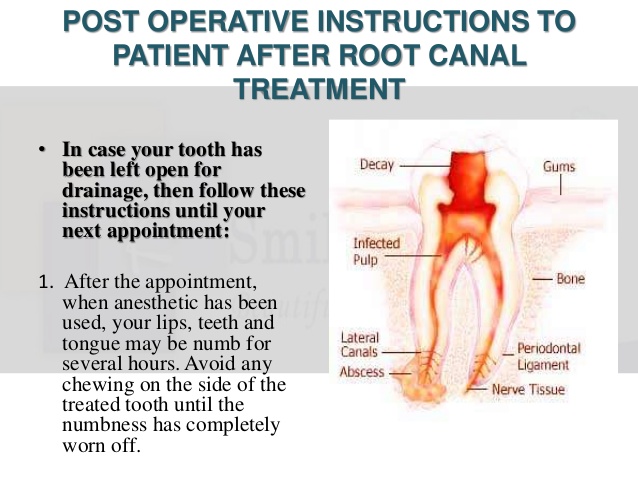

Teeth Cleaning (Deep Cleaning):




Placement of Braces:
1- You may experience some pressure and discomfort on your teeth.
2- Be gentle with braces and avoid chewing hard and/or sticky food.
3- Brushing and flossing around braces is sometimes challenging and time consuming, but very important.
4- Call our office if you have any questions.
Eating Habits
A. Nothing sticky, gummy, chewy or hard. Examples:
No gum, caramels, taffy or whole bagels.
No popcorn, nuts or ice cubes
Cut raw fruits and vegetables into sections.
Cut corn off the cob..
Don’t bite into chicken or ribs on the bone.
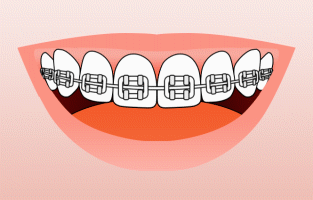
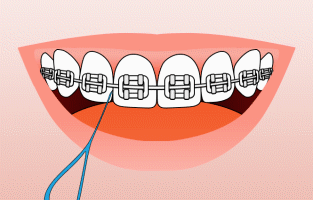
Gum Surgery:
1- You may experience some pain, swelling, and bleeding after the surgery.
2- Take all medication that was prescribed for you according to instructions.
3- Apply an ice bag on your face over the surgical site on the day of surgery for 10 minutes on and 5 minutes off.
4- Keep your next appointment on time for removal of sutures and follow up
checks.
5- DO NOT raise your lips with your fingers to inspect the treated area.
6- DO NOT brush teeth near the surgical site. Brush teeth in the rest of your mouth.
7- There is often a temporary loss of feeling in the operated area and the tooth may feel loose.
8- Do not smoke, spit, or use a straw on the day of the surgery (avoid smoking for a few days after the surgery).
9- Should any difficulties occur, do not hesitate to call our office anytime. In case of serious emergencies call 911.
Implant Surgery:
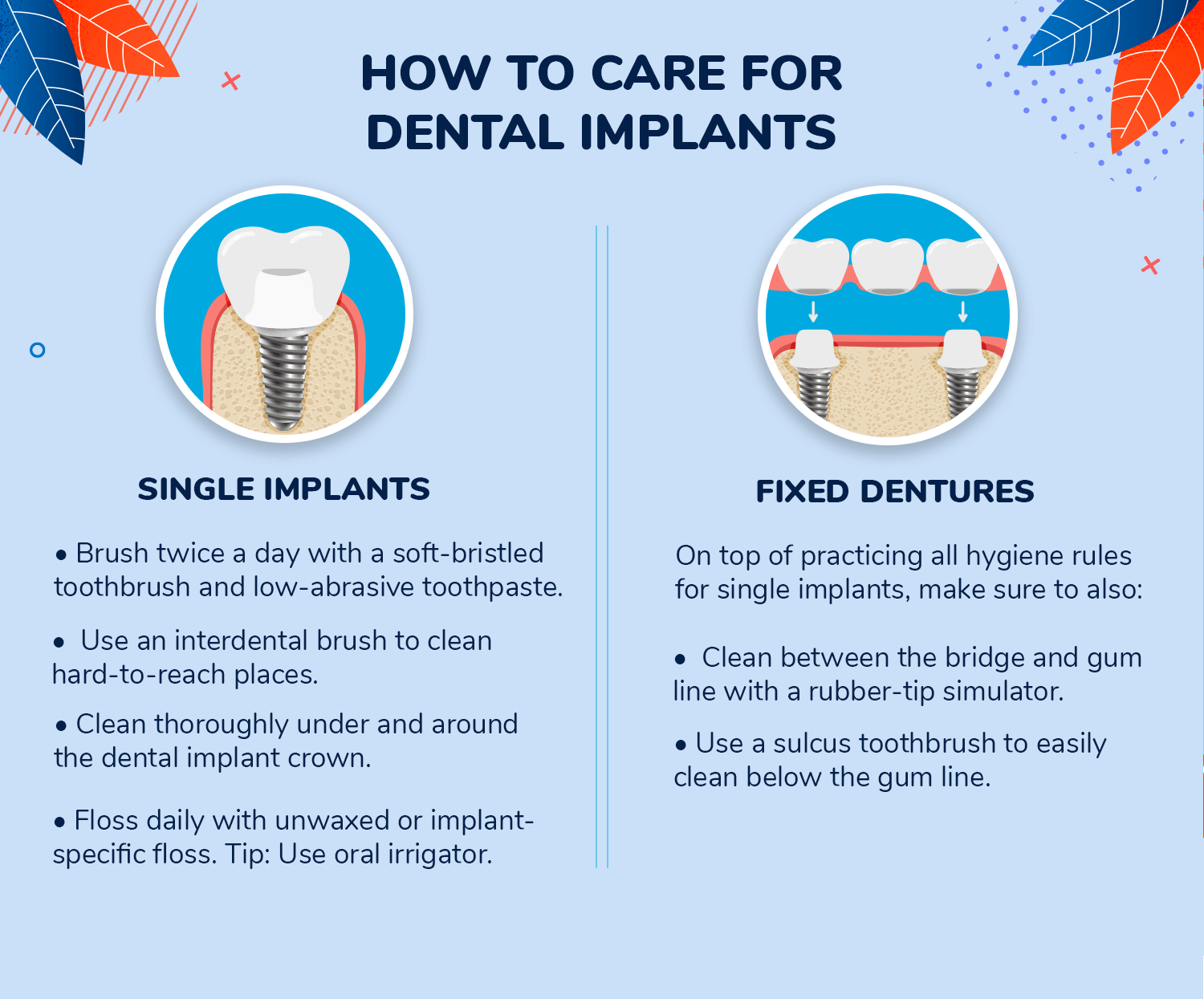
1- You may experience some discomfort and bleeding the day of the surgery.
2- Take all medication that was prescribed for you according to instructions.
3- Apply an ice bag on your face over the surgical site on the day of surgery for 10 minutes on and 5 minutes off.
4- Keep your next appointment on time for removal of sutures and follow up checks.
5- DO NOT raise your lips with your fingers to inspect the treated area.
6- DO NOT brush teeth near the surgical site. Brush teeth in the rest of your mouth.
7- There is often a temporary loss of feeling in the operated area and the
tooth may feel loose.
8- Do not smoke, spit, or use a straw on the day of the surgery (avoid smoking for a few days after the surgery).
9- Should any difficulties occur, do not hesitate to call our office anytime. In case of serious emergencies call 911.
Denture Delivery:

1- You will experience some discomfort with any new denture for a few days. All new dentures need several adjustments to completely and comfortably fit your mouth.
2- You should take the dentures out every night and keep them in a clean container filled with water or denture cleaning solution. Your gums need to rest and be without the dentures every day for a period of time.
3- Clean dentures thoroughly with a brush and water before putting them back in your mouth.
4- It may be difficult to talk normally with the new dentures for a few days. One way to practice is to read a book or newspaper out loud for a period of time everyday. Your tongue and muscles will get used to the new dentures and you will talk normally very soon.
5- Call our office if you are experiencing pain, discomfort, or if you have any questions.
Apicoectomy (Root Canal Surgery):
1- Swelling, minor pain and/or skin discoloration may be experienced following the surgical procedure. This will be temporary.
2- In order to keep the swelling to a minimum, use an ice pack for the first few hours after surgery (on for 10 minutes and off for 5 minutes).
3- The day after the surgery, use lukewarm water rinses for the treated area following each meal. This should continue for the first 3 days following the surgical procedure.
4- Eat only soft foods. Avoid hard and chewy foods.
5- Get plenty of rest and insure normal intake of food, especially liquids such as fruit juices, soup, and milk. Use a vitamin supplement if desired. Try not to sleep on the operated area for 2-3 days.
6- DO NOT raise your lips with your fingers to inspect the treated area.
7- DO NOT brush teeth near the surgical site. Brush teeth in the rest of your mouth.
8- There is often a temporary loss of feeling in the operated area and the tooth may feel loose.
9- Take all medication that was prescribed for you according to instructions.
10- Should any difficulties occur, do not hesitate to call our office anytime. In case of serious emergencies call 911.
Bone Graft Surgery
You have just had surgery completed for the reduction of periodontal pocketing and/or for replacement of bone in an area where pathology existed, or in conjunction with endosseous dental implant surgical placement with or without platelet addition to the bone graft. You will be advised of the particular procedure and pertinent directions relative to your treatment modality. Whether you were put to sleep for this procedure or were only given local anesthesia, the post-operative instructions remain the same.
You will have several sutures (stitches) placed at the surgical site. These sutures may or may not be resorbable. If you have been told that you received external silk sutures, they have to be removed by us. The sutures will cause a pulling of your tissue over the bone grafting site. Since the bone graft site will have approximately 15 % more bone fill than what was naturally there, it is imperative that you do not pull up your lips or cheeks to show or examine the area. The undue pressure will cause the sutures to widen away from the surgical site, expose bone, create more pain, and delay healing dramatically. This delay can lead to the need for the area to be sutured again when you are seen for your 1 week post-surgical evaluation. The sutures will remain in place for 2 to 3 weeks depending on the size of the graft, the severity of the pathology, and the condition of the tissue being sutured.
Your doctor will tell you what time period to expect, but keep in mind that this is not etched in stone and the doctor may extend the time before your sutures are removed to assure adequate healing and to avoid surgical regression.
You also may have a periodontal pack placed over the surgical site. The pack is pink in color and impregnated with antibiotic, which will protect the surgical site from infection and any washout of the particulate bone utilized to restore your jaw. The pack should be left in place for as long as possible. If a pack is placed the doctor will remove the packing at your 1 week follow up and decide if the packing should be replaced or kept off. Usually the packing is kept on for 7 to 10 days at a minimum. You must return to the office if your pack falls off before you are seen for your 1 week follow up.
Your maintenance during healing has to be completed carefully. You can brush in every area except where the periodontal pack is placed. It is imperative that you use NO ASTRINGENTS such as mouth wash or antiseptic solutions during the healing period of your bone graft. Listerine, Viadent, or any other potentially caustic agent can RUIN your bone grafting procedure if contaminated, and require a replacement bone graft. The doctor and our staff will reiterate this to you at, during, and after your bone graft surgical procedure. After the first stages of healing are satisfactory, we will provide you with normal saline and instruct you on how to use it (with or without the addition of salt), as well as irrigation syringes for cleaning the surgical site.
Since bone grows and heals slowly, it requires conditions conducive to a proper environment and blood supply. Thus, it is imperative that immediately after your bone graft you alter your diet, as you would for any oral surgical procedure. This means that you should not eat anything that is too large, too hot, or too sticky. Your food should be tepid or on the cool side. Any food that is too hot will have a deleterious effect on your surgical procedure. Common sense must be used in determining what should be done or avoided. If for some reason you have questions about anything post-surgically, please call the office and we will inform you of the proper action to take.
Smoking after any oral surgical procedure will ALWAYS delay or disrupt normal healing due to a decrease in oxygenation of the tissue that is healing. Smoking should therefore be stopped for the first 7 to 10 days to allow for adequate initial tissue closure. Complete epithilization (closure) and wound healing normally takes a minimum of 21 days from the day the surgery was completed under ideal healing conditions, and with no other underlying systemic causes such as Diabetes Melitus, etc.
Bone grafting is a very predictable surgical procedure when done correctly and when patient cooperation is adhered to. Please try to be reasonable in understanding that this procedure has inherent risks associated with it, as stated in your informed consents. Some of these risks are also pertinent to your post-operative care.
We want nothing more than a perfect outcome with the surgical procedures that you are having done to rehabilitate your bone. This can only be attained with your cooperation. Please feel free to communicate with us at any time to make sure that the procedures you are having are properly maintained. No question is ever perceived by our office as being silly or unreasonable. We would rather have questions answered immediately than risk the chance that the procedure will not go as planned, especially from omissions that are preventable.
As stated above and outlined in your informed consents, please remember that there are some instances when no matter what is done, the outcome is not perfect. There are even infrequent occasions when a surgery may have to be redone; these situations are neither the doctors nor the patients fault.
Thank you

